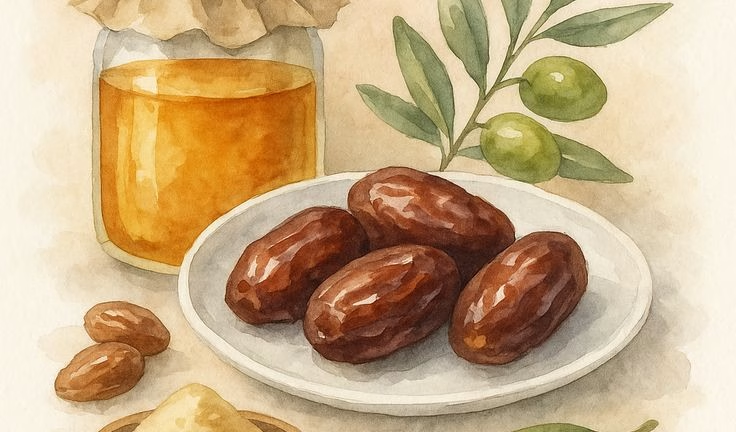Discover the powerful health benefits of Sunnah foods like dates, olives, and black seed. Learn how the Prophet’s (PBUH) diet aligns with modern science for optimal wellness.
In our search for the latest superfoods and wellness trends, we often overlook a treasure trove of nutritional wisdom that is over 1,400 years old. The diet of Prophet Muhammad (ﷺ) was simple, purposeful, and divinely guided.
These Sunnah foods are not just acts of worship to be rewarded; they are packed with incredible health benefits that modern science is only now beginning to fully understand. Integrating them into your diet is a holistic way to care for your body, in line with the prophetic tradition.
Let’s explore seven of these powerful foods and why they deserve a permanent place in your kitchen.
1. Dates (Ajwa, Medjool, etc.)
The Prophet (ﷺ) said, “A house that has no dates, its inhabitants are hungry.” (Muslim)
He would famously break his fast with fresh dates or, if not available, with dried ones. This is a profound practice, as fasting depletes the body’s glucose levels.
Modern Health Benefits:
· Instant Energy Boost: Dates are rich in natural sugars like glucose, fructose, and sucrose, providing a quick and healthy energy source.
· Aids Digestion: High in soluble fiber, they prevent constipation and promote a healthy digestive system.
· Rich in Minerals: They are a great source of potassium, magnesium, copper, and manganese, which are essential for nerve health, bone strength, and blood pressure regulation.
How to Eat: Break your fast with 1-3 dates. Add them to smoothies, energy balls, or simply enjoy them as a natural sweetener.
2. Olives and Olive Oil
The Prophet (ﷺ) said, “Eat olive oil and use it (as ointment), for it comes from a blessed tree.” (Tirmidhi)
Modern Health Benefits:
· Heart Health Champion: Olive oil is packed with monounsaturated fats (like oleic acid) which help reduce bad cholesterol (LDL) and increase good cholesterol (HDL).
· Powerful Antioxidants: It contains oleuropein and hydroxytyrosol, strong anti-inflammatory compounds that protect cells from damage.
· Brain & Memory Support: Studies link the Mediterranean diet (rich in olive oil) to a lower risk of Alzheimer’s disease and cognitive decline.
How to Eat: Use extra virgin olive oil as a dressing for salads, drizzle over bread, or use it for low-heat cooking.
3. The Miraculous Black Seed (Habba Sawda)
The Messenger (ﷺ) said, “This black seed is a cure for every disease except death.” (Sahih al-Bukhari)
This is a powerful testament to its potential. While not a literal cure-all, its wide-ranging benefits are astounding.
Modern Health Benefits:
· Immune System Booster: Thymoquinone, its active compound, has potent antioxidant and anti-inflammatory properties.
· Anti-Cancer Potential: Preliminary studies show black seed oil may help in apoptosis (cell death) in certain cancer cell lines.
· Fights Inflammation: It can be helpful in reducing symptoms of asthma, allergies, and rheumatoid arthritis.
How to Eat: Take half a teaspoon of black seed oil daily, mixed with honey or water. You can also sprinkle the seeds on bread or salads.
4. Honey (The Divine Healer)
Allah says in the Quran: “There emerges from their bellies a drink, varying in colors, in which there is healing for people.” (Surah An-Nahl, 16:69)
The Prophet (ﷺ) emphasized honey for stomach ailments.
Modern Health Benefits:
· Natural Antibiotic: Its low pH and hydrogen peroxide content give it natural antibacterial and antifungal properties.
· Soothes Sore Throats: A classic remedy for coughs and colds, it coats and soothes the throat.
· Rich in Antioxidants: High-quality, raw honey contains plant compounds that can help reduce oxidative stress.
How to Eat: A spoonful of raw, local honey can soothe a sore throat. Add it to warm water with lemon, but avoid boiling it to preserve its enzymes.
5. Barley (Sha’ir)
The Prophet (ﷺ) recommended barley for healing the sick, particularly for those with heart ailments.
Modern Health Benefits:
· Lowers Cholesterol: Barley is rich in beta-glucan, a soluble fiber that is very effective at lowering bad cholesterol.
· Blood Sugar Regulator: The same fiber helps slow down the absorption of sugar, preventing sharp spikes in blood glucose.
· Promotes Gut Health: It acts as a prebiotic, feeding the good bacteria in your gut.
How to Eat: Enjoy it as a hearty soup (Talbinah), use barley flour in baking, or add pearled barley to stews and salads.
6. Pumpkin (Yaqteen)
It is mentioned that the Prophet (ﷺ) loved pumpkin and would look for it in dishes.
Modern Health Benefits:
· Vision & Skin Health: Incredibly high in Beta-Carotene, which your body converts into Vitamin A.
· Boosts Immunity: Packed with Vitamin C, which is crucial for immune function and collagen production.
· Nutrient-Dense & Low Calorie: A great way to get vitamins and minerals without many calories.
How to Eat: Roast it, make pumpkin soup, or add it to curries and stews.
7. Cucumbers (Qiththa’)
The Prophet (ﷺ) would often eat cucumbers with fresh dates.
Modern Health Benefits:
· Hydration: Composed of over 95% water, making it excellent for hydration and skin health.
· Aids in Weight Management: Low in calories and high in water and fiber, promoting a feeling of fullness.
· Contains Antioxidants: Provides nutrients like Vitamin K, potassium, and antioxidants like flavonoids.
How to Eat: Enjoy in salads, as a crunchy snack with hummus, or infused in your water.
Conclusion: A Timeless Prescription for Health
The wisdom of the Prophet (ﷺ) transcends time. These Sunnah foods are a powerful reminder that the best way to nourish our bodies is often the simplest and most natural way. By consciously incorporating these blessed foods into our diets, we are not only following a sacred tradition but also investing in our long-term health and well-being, insha’Allah.
What is your favorite Sunnah food? How do you include it in your diet? Share your tips in the comments below!


